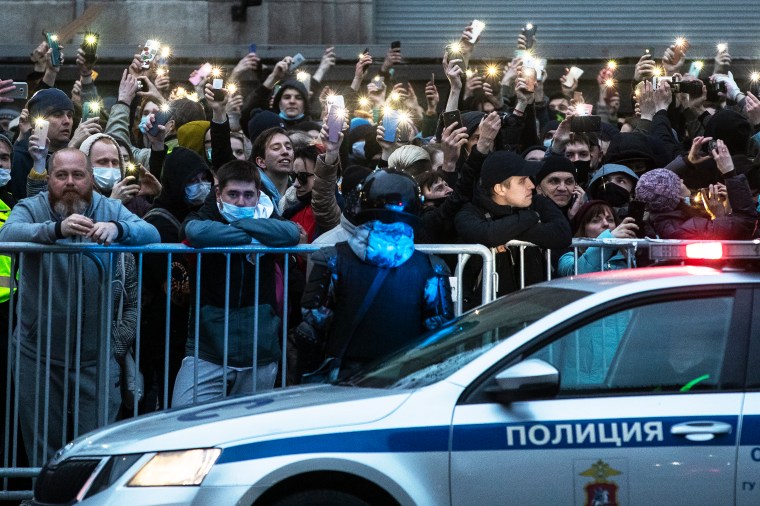Vilnius, Lithuania, April 29, 2021 — Russian authorities should release journalist Sergey Stepanov immediately and should cease detaining and harassing members of the press covering protests, the Committee to Protect Journalists said today.
Yesterday, the Oktyabrsky District Court in the central Russian city of Tambov sentenced Stepanov, a freelance correspondent for Finnish TV and radio broadcaster IRR-TV, to 30 days in detention for allegedly participating in an unsanctioned protest on April 21, according to news reports and the journalist’s lawyer, Denis Turbin, who spoke to CPJ in a phone interview.
Turbin told CPJ that the court hearing took only 15 minutes, and the judge disregarded Stepanov’s press card and assignment sheet showing that he was covering the protest in support of Russian opposition leader Alexei Navalny as a journalist, and not participating in it. Turbin said that he planned to appeal the decision immediately.
“Russian authorities should immediately release journalist Sergey Stepanov, who has been falsely accused of participating in a protest that he covered as a journalist, and not contest his appeal,” said Gulnoza Said, CPJ’s Europe and Central Asia program coordinator, in New York. “Russian law enforcement should stop their attempts to intimidate and harass journalists out of covering events of national interest.”
In a phone interview with CPJ, IRR-TV CEO Hannu Hauka confirmed that Stepanov was on assignment for the broadcaster during the April 21 rally.
Turbin said that police approached Stepanov while he was filming the rally and interviewing participants, and they let him continue reporting after he showed them his press badge and assignment sheet. Yesterday, police arrested, charged, and convicted Stapanov of illegally participating in that protest, his lawyer said.
CPJ called the Oktyabrsky District Court, and an officer who answered said that the court could not comment on Stepanov’s case.
Separately, on April 27, police briefly detained several journalists throughout the country over their coverage of pro-Navalny rallies, including independent broadcaster Dozhd TV correspondent Aleksey Korostelev, independent radio station Ekho Moskvy correspondent Oleg Ovcharenko, pro-government news website Komsomolskaya Pravda reporter Aleksandr Rogoza, and TV station RTVI head of photography Ivan Krasnov, according to multiple news reports.
Those journalists were all released without charge, according to those reports.
Also on April 27, police questioned Anton Sergiyenko, a reporter for the U.S. Congress-funded broadcaster Radio Free Europe/Radio Liberty, and Kristina Safronova, a correspondent for the independent news website Meduza, over their alleged participation in protests, according to news reports.
Yesterday, police officers briefly detained Georgiy Malets, a correspondent with the independent Poland-based satellite broadcaster Belsat TV, and questioned him about his alleged participation in the April 21 rally, which he had covered for the broadcaster, news reports said.
Svetlana Kuzevanova, a lawyer at Mass Media Defense Center in Moscow, told CPJ in a phone interview that such harassment of journalists over their protest coverage was “a kind of psychological pressure and intimidation.”
On April 27, in response to questions about journalist detentions, presidential spokesperson Dmitry Peskov accused an unspecified person who is not a journalist of possessing a press card at the April 21 protest, reports said.
When CPJ called Russian Interior Ministry, an official who answered said that the ministry had no comment on the recent arrests and detentions of journalists covering protests in the country.
[Editors’ note: This article has been changed in its eighth paragraph to correct the spelling of Aleksandr Rogoza‘s name.]
